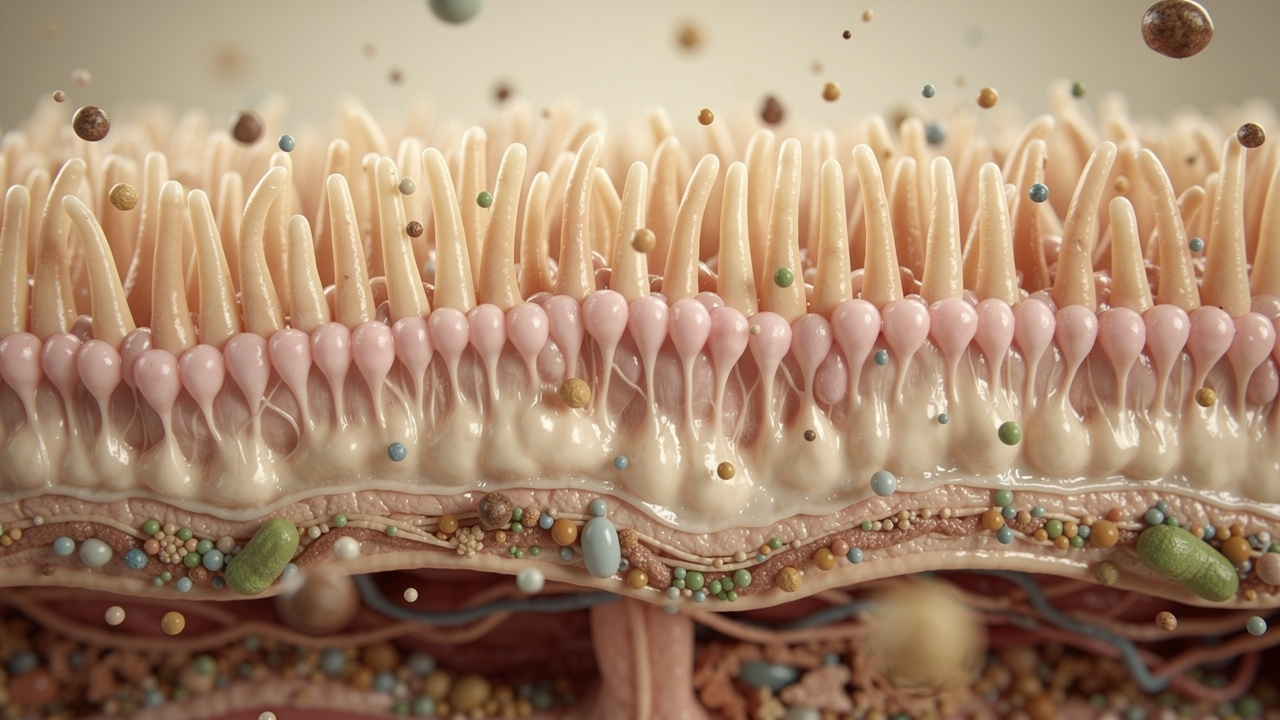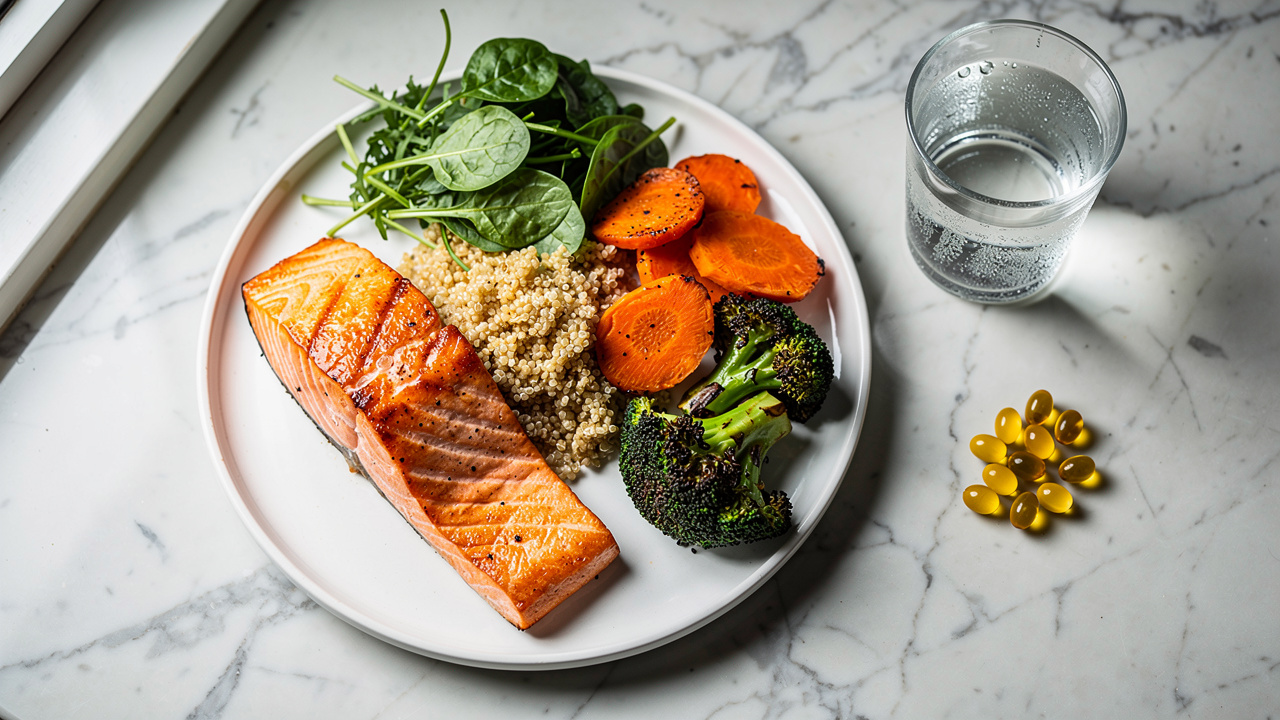Berberine And GLP-1: How This Natural Compound Acts As A Powerful Agonist
Berberine has exploded in popularity, often labeled “nature’s Ozempic” on social media. Much of that interest comes from the connection between berberine and GLP-1, a gut hormone targeted by blockbuster drugs like Ozempic and Wegovy for blood sugar control and weight loss.
Berberine is a plant-derived alkaloid found in goldenseal, barberry, and Oregon grape. Synchronicity Health’s Berberine with Ceylon Cinnamon combines this compound with a gentler cinnamon species that supports healthy blood sugar and adds antioxidant protection.
GLP-1 (glucagon-like peptide-1) is produced in the gut after you eat. It helps:
-
Trigger insulin when glucose is high
-
Reduce glucagon (which otherwise raises blood sugar)
-
Slow stomach emptying
-
Increase feelings of fullness
Pharmaceutical GLP-1 agonists are engineered to mimic this hormone directly. The connection between berberine and GLP-1 is different: berberine appears to stimulate your own GLP-1 production while also activating other powerful metabolic pathways.
For biohackers, athletes, and longevity-focused professionals, understanding how berberine and GLP-1 interact is key to deciding whether this berberine supplement belongs in a performance and health strategy.
GLP-1 Basics: The Hormone Behind Satiety And Blood Sugar Control

Before digging into berberine and GLP-1 together, it helps to understand what GLP-1 does on its own.
GLP-1 is released by specialized L-cells in the small intestine when nutrients arrive from a meal. Once in circulation, GLP-1:
-
Boosts glucose-dependent insulin secretion
When blood sugar rises, GLP-1 helps pancreatic beta cells release insulin. It does not push insulin when glucose is low, which is why GLP-1–based approaches carry less risk of hypoglycemia than some older drugs. -
Suppresses glucagon
GLP-1 reduces secretion of glucagon from pancreatic alpha cells. Less glucagon means the liver releases less stored glucose into the bloodstream. -
Slows gastric emptying
Food leaves the stomach more gradually, flattening post-meal glucose spikes and extending satiety. -
Supports appetite control
GLP-1 signals the brain that you are full. This effect overlaps with other signaling molecules such as OEA; Synchronicity Health’s oea oleoylethanolamide appetite control product is designed to tap into that pathway.
Taken together, GLP-1 is a central controller for appetite, body weight, and glycemic control—exactly why there is so much interest in the intersection of berberine and GLP-1.
As many endocrinologists explain, “metabolism is less about willpower and more about hormones and signaling such as GLP-1.”
How Berberine Influences GLP-1 And Metabolic Pathways
Berberine does not act like a synthetic GLP-1 agonist drug. Instead, the link between berberine and GLP-1 involves several interconnected mechanisms that touch energy balance, gut health, and hormone signaling.
AMPK: Berberine’s Core Metabolic Switch
One of berberine’s best-characterized actions is activation of AMPK (adenosine monophosphate–activated protein kinase), often described as a master regulator of energy status.
When AMPK is activated:
-
Cells burn more fatty acids for fuel
-
New fat and cholesterol production decreases
-
Insulin sensitivity improves
-
Glucose uptake into muscle increases
This AMPK effect partly explains why berberine and GLP-1 conversations often extend beyond blood sugar into fat loss, lipid balance, and mitochondrial health.
Gut Microbiome → SCFAs → L-Cells → GLP-1
Emerging research fills in the more direct connection between berberine and GLP-1:
-
Berberine reshapes the gut microbiota
People with metabolic syndrome and type 2 diabetes often show disrupted gut flora. Berberine tends to move the microbiome toward a profile associated with better metabolic health. -
Increased production of short-chain fatty acids (SCFAs)
As the microbiome shifts, bacterial fermentation of fiber yields more SCFAs like butyrate and propionate. -
SCFAs activate intestinal L-cells
These SCFAs bind to receptors on L-cells lining the intestine, acting as signals. -
L-cells secrete more GLP-1
The net result is higher endogenous GLP-1 output, with downstream benefits for insulin secretion, appetite signals, and fat storage.
There is also evidence that berberine can influence GLP-1–linked insulin secretion via the PLC2 signaling pathway in the intestine, adding another layer to the connection between berberine and GLP-1.
Oxidative Stress, Inflammation, And Mitochondria
Metabolic diseases are closely tied to oxidative stress and chronic inflammation. This is where pairing berberine and GLP-1 modulation with targeted antioxidant support becomes especially interesting.
Synchronicity Health’s glutathione nasal spray delivers the body’s master antioxidant through a route that bypasses digestion. Used alongside berberine, it may help:
-
Support mitochondrial function
-
Protect gut and liver tissue
-
Reduce oxidative damage that interferes with insulin signaling
For high performers using NAD+ IV therapy or other mitochondrial protocols, combining berberine, GLP-1 support, and focused antioxidant strategies can make metabolic work more efficient.
Key Health Benefits Of Supporting Berberine And GLP-1 Pathways
Because berberine and GLP-1 influence overlapping metabolic circuits, with research documenting berberine's impact on health across multiple systems, supporting both can affect several domains that matter for longevity and performance.
Blood Sugar Regulation And Insulin Sensitivity

Human trials consistently show that berberine:
-
Lowers fasting blood glucose
-
Reduces HbA1c (3-month blood sugar average)
-
Improves insulin sensitivity
In some studies, berberine’s glucose-lowering effect rivals that of metformin. When you pair the AMPK effects with increased GLP-1 secretion, the net result is better control of how your body handles carbohydrates.
Formulations that combine berberine and cinnamon, such as Berberine with Ceylon Cinnamon, further support this by helping maintain healthier post-meal glucose curves.
Weight Management And Appetite Control

The weight-loss conversation around berberine and GLP-1 is where “nature’s Ozempic” headlines come from. Here is what the data actually suggest:
-
In overweight adults, 1,000 mg/day of berberine for 8–12 weeks has been associated with reductions in body weight, BMI, and waist circumference.
-
Increased GLP-1 and improved insulin sensitivity both play a role in reducing fat gain and encouraging fat use for energy.
-
Slower gastric emptying and better satiety signaling reduce the drive to overeat.
Stacking berberine with oea oleoylethanolamide appetite control may further reinforce satiety by acting through complementary gut-brain pathways.
As many clinicians tell patients, “no supplement replaces good nutrition and movement—but the right one can make both feel a lot easier.”
Cardiovascular And Lipid Health
By tuning both AMPK and GLP-1–related pathways, berberine demonstrates meaningful effects on cardiovascular risk markers:
-
Lowers triglycerides
-
Reduces LDL (“bad”) cholesterol
-
Can raise HDL (“good”) cholesterol in some people
Some reviews suggest berberine’s effect on lipids can be comparable to statins for certain outcomes, and using it along with statins may further lower risk without adding substantial side effects in many cases. Because oxidative stress is part of the atherosclerosis process, combining berberine with glutathione nasal spray adds another layer of support.
Gut, Brain, And Immune Support

The same microbiome changes that connect berberine and GLP-1 also affect digestion, immune function, and the brain:
-
A more balanced microbiome is linked to better gut barrier integrity and lower inflammation.
-
Preclinical work suggests berberine may slow progression of certain inflammatory bowel issues and liver conditions.
-
There are early signals for benefits in mood and cognitive function through both microbiome and mitochondrial pathways.
Stacking berberine with medicinal mushrooms is an emerging strategy. Lion’s mane medicinal mushrooms and reishi are particularly promising:
-
Lion’s mane is studied for nerve growth factor support and cognitive health.
-
Reishi is valued for immune modulation and stress resilience. Synchronicity Health’s reishi mushroom blend adds these beta-glucan–rich compounds in a convenient format.
-
Mushroom cocoa with lion’s mane and cordyceps offers gentle support for focus, mood, and endurance while pairing well with berberine’s metabolic effects.
For athletes and active professionals, these combinations can support recovery, brain function, and immune resilience alongside metabolic health.
Berberine And GLP-1 Drugs: How They Compare
Because both berberine and GLP-1 drugs influence similar outcomes, it is easy to conflate them. The reality:
-
GLP-1 agonist medications (like semaglutide) are synthetic analogs of GLP-1. They directly activate GLP-1 receptors, have long half-lives, and are approved as prescription medications for type 2 diabetes and obesity.
-
Berberine is a dietary supplement that indirectly increases GLP-1 and activates AMPK, along with multiple other targets.
Key differences:
|
Aspect |
GLP-1 Agonist Medications |
Berberine Supplements |
|---|---|---|
|
Strength of Effect |
Large and rapid reductions in weight and HbA1c, but with more pronounced side effects and higher cost. |
More moderate changes in weight and glucose markers, often well suited to prediabetes or early metabolic issues. |
|
Regulatory Status |
Prescription-only, backed by large clinical trials and strict regulatory review. |
Sold over the counter; quality, purity, and dosing can vary between brands. |
|
Typical Use Case |
Primary treatment for type 2 diabetes or obesity when prescribed by a clinician. |
Metabolic support for people who are not on GLP-1 drugs, or who use it alongside medical care under supervision. |
Many people exploring berberine and GLP-1–related strategies are either not candidates for GLP-1 drugs, prefer a non-prescription route, or want support between or alongside medical treatments under clinical supervision.
Berberine should not be viewed as a one-to-one replacement for GLP-1 medications, but rather as a multifaceted metabolic support tool.
How To Use Berberine For GLP-1 Support And Metabolic Health
If you are considering using berberine to support GLP-1 and overall metabolism, several practical factors matter: dose, timing, and how you combine it with other tools.
Typical Dosing
Human studies most often use:
-
900–2,000 mg per day, divided into 2–3 doses
-
A common pattern is 500 mg two to three times daily with meals
Many people start at 300–500 mg once per day for a few days to assess tolerance, then increase gradually. Benefits on blood sugar and body composition generally appear over 8–12 weeks of consistent use.
Formulations such as Berberine with Ceylon Cinnamon are designed to support these metabolic targets while adding the complementary effects of Ceylon cinnamon.
Timing And Practical Tips
-
Take with meals
This tends to reduce gastrointestinal side effects and supports post-meal glucose control. -
Split doses
Dividing the total daily dose keeps berberine levels steadier through the day. -
Support training sessions
Some athletes take a dose with the meal before training to help with glucose handling around workouts, while others avoid pre-workout berberine to keep acute glucose availability higher. This is personal and can be tested.
Stacking With Other Synchronicity Health Formulas
For people focused on performance, resilience, and longevity, thoughtful stacking makes the relationship between berberine and GLP-1 more practical:
-
Appetite and weight control
Pair berberine with oea oleoylethanolamide appetite control to reinforce satiety signals from multiple directions. -
Oxidative stress and mitochondrial support
Combine berberine with glutathione nasal spray to support antioxidant defenses that protect mitochondria, especially if you are also using NAD+ IV therapy or intense training blocks. -
Cognitive and immune support
Add lion’s mane medicinal mushrooms, a reishi mushroom blend such as reishi mushroom, or a mushroom cocoa formula that includes lion’s mane and cordyceps to support focus, stress response, and immune health.
These combinations allow you to work through multiple mechanisms—AMPK, GLP-1, OEA signaling, antioxidant defenses, and immune modulation—without relying on heavy stimulants.
Safety, Side Effects, And What The Research Really Shows
Even though many people tolerate berberine well, the combination of berberine and GLP-1 effects still deserves a careful, clinical mindset.
As many clinicians remind people, “natural is not the same thing as risk‑free.”
Common Side Effects
Most side effects are gastrointestinal and dose-dependent:
-
Nausea
-
Stomach pain, cramping, or bloating
-
Diarrhea or, less often, constipation
-
Headache in some users
Starting with a lower dose and taking berberine with food usually makes these effects milder.
Medication Interactions
Berberine interacts with several drug classes:
-
Diabetes medications (metformin, insulin, sulfonylureas)
Because berberine and GLP-1–related mechanisms both lower blood sugar, using them on top of glucose-lowering prescriptions without supervision can increase hypoglycemia risk. -
Anti-rejection drugs (e.g., cyclosporine)
Berberine can affect drug metabolism and transport, potentially reducing the effectiveness of transplant medications. This combination should be avoided unless a specialist is directly supervising. -
Blood thinners and antiplatelet drugs
Berberine may influence platelets and liver enzymes, which can alter how drugs like warfarin or aspirin behave. -
Medications metabolized by liver enzymes (CYP450)
By inhibiting certain cytochrome P450 enzymes, berberine can raise blood levels of some drugs and increase side-effect risk.
The same cautious approach should apply to other potent formulas, including glutathione nasal spray, even though it is generally well-tolerated.
Pregnancy, Breastfeeding, And Special Populations
Berberine is not recommended during pregnancy or breastfeeding. It can cross the placenta and enter breast milk, and in infants may worsen jaundice by contributing to excess bilirubin.
People with significant liver or kidney disease, or those on complex drug regimens, should only use berberine under medical guidance.
What The Evidence Shows—And What It Doesn’t
Current research on berberine and GLP-1 is promising but not definitive:
-
Many trials are small and short-term.
-
Long-term safety and effectiveness across different groups of people are not fully known.
-
Supplements are not regulated like drugs, so product quality matters greatly.
That said, repeated findings across studies indicate:
-
Improved fasting glucose and HbA1c
-
Better lipid profiles
-
Moderate reductions in body weight and waist circumference
-
Positive effects on markers of oxidative stress and inflammation
Adding antioxidants like glutathione nasal spray and immune-modulating compounds such as reishi and lion’s mane may further support these outcomes, but this area still needs more human data.
For now, berberine should be seen as a powerful adjunct for metabolic health, not as a stand-alone cure or a direct replacement for GLP-1 medications.
Smart Stacking Ideas With Synchronicity Health Formulas
For performance-focused users, the practical question is how to build a smart, efficient protocol using berberine and GLP-1 support.
Here are stack concepts that align with Synchronicity Health formulations:
-
Metabolic reset stack
-
Berberine with Ceylon Cinnamon with meals
-
oea oleoylethanolamide appetite control for additional satiety support
-
Tight nutrition and resistance training 3–4 times per week
-
-
Longevity and mitochondrial support stack
-
Berberine daily for AMPK and GLP-1 support
-
NAD+ IV therapy or precursors as directed by your clinician
-
glutathione nasal spray to support antioxidant defenses and cellular detox capacity
-
-
Brain, immune, and performance stack
-
Berberine to support metabolic flexibility
-
Lion’s mane medicinal mushrooms for cognitive health
-
A reishi mushroom blend for immune balance and stress response
-
Mushroom cocoa that includes lion’s mane and cordyceps for gentle focus and endurance without heavy stimulants
-
These stacks are best customized in consultation with a knowledgeable practitioner who understands both supplements and prescription therapies.
The Bottom Line On Berberine And GLP-1
The relationship between berberine and GLP-1 is one of the most interesting areas in metabolic health right now:
-
Berberine activates AMPK, reshapes the gut microbiome, and increases GLP-1 secretion.
-
These changes support better blood sugar control, improved lipid profiles, and moderate weight loss.
-
While GLP-1 drugs remain the most potent tools for rapid weight and glucose changes, berberine offers a compelling, accessible option for people seeking a more natural, multi-pathway approach.
When combined with clinically thoughtful stacks—such as Berberine with Ceylon Cinnamon, glutathione nasal spray, oea oleoylethanolamide appetite control, and reishi or lion’s mane blends—berberine becomes a central tool for people serious about performance, longevity, and metabolic resilience.
As always, especially if you are on medications or considering GLP-1 drugs, partner with a healthcare professional who understands both sides of the equation so you can use berberine and GLP-1–focused strategies in a safe, effective way.




Leave a comment
All comments are moderated before being published.
This site is protected by hCaptcha and the hCaptcha Privacy Policy and Terms of Service apply.